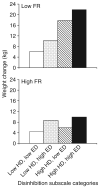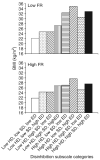Aspects of eating behaviors "disinhibition" and "restraint" are related to weight gain and BMI in women
- PMID: 18223612
- PMCID: PMC2713727
- DOI: 10.1038/oby.2007.12
Aspects of eating behaviors "disinhibition" and "restraint" are related to weight gain and BMI in women
Abstract
Objective: The causes of adult weight gain leading to obesity are uncertain. We examined the association of adult weight gain and obesity with subscales of eating behavior characteristics in older women.
Methods and procedures: Current height and weight, eating behavior subscales (disinhibition subscales-habitual, situational, and emotional; restraint subscales-flexible and rigid; hunger subscales-internal and external) as assessed using the Eating Inventory (EI), and self-reported body weight at six prior age intervals were reported by 535 women aged 55-65 years. Multiple regression analysis was used to examine the relationships between EI subscale scores and weight change from the age interval of 30-39 to 55-60 years and current BMI.
Results: The strongest correlate of weight gain over 20 years was susceptibility to overeating in response to everyday cues within the environment (habitual disinhibition; partial correlation coefficient (r) = 0.25, P < 0.001); susceptibility to overeating in response to emotional states such as depression (emotional disinhibition) was a quantitatively weaker but significant correlate (partial r = 0.17, P < 0.001), and susceptibility to overeating in response to specific situations such as social occasions (situational disinhibition) was not associated with weight gain. Flexible control of dietary restraint attenuated the influence of habitual disinhibition in particular on weight gain and BMI, and was less effective in attenuating associations of emotional or situational disinhibition.
Discussion: Lifestyle modification programs for prevention and treatment of adult-onset obesity currently focus on reducing situational and emotional overeating; the results of this study suggest that a stronger emphasis on strategies that target habitual overeating may be warranted.
Figures


Similar articles
-
Eating behavior correlates of adult weight gain and obesity in healthy women aged 55-65 y.Am J Clin Nutr. 2002 Mar;75(3):476-83. doi: 10.1093/ajcn/75.3.476. Am J Clin Nutr. 2002. PMID: 11864852
-
Eating style, overeating and weight gain. A prospective 2-year follow-up study in a representative Dutch sample.Appetite. 2012 Dec;59(3):782-9. doi: 10.1016/j.appet.2012.08.009. Epub 2012 Aug 20. Appetite. 2012. PMID: 22918175
-
Mediation and moderation of genetic risk of obesity through eating behaviours in two UK cohorts.Int J Epidemiol. 2023 Dec 25;52(6):1926-1938. doi: 10.1093/ije/dyad092. Int J Epidemiol. 2023. PMID: 37410385 Free PMC article.
-
[Assessing various aspects of the motivation to eat that can affect food intake and body weight control].Encephale. 2009 Apr;35(2):182-5. doi: 10.1016/j.encep.2008.03.009. Epub 2008 Jul 7. Encephale. 2009. PMID: 19393389 Review. French.
-
Disinhibition: its effects on appetite and weight regulation.Obes Rev. 2008 Sep;9(5):409-19. doi: 10.1111/j.1467-789X.2007.00426.x. Epub 2007 Dec 26. Obes Rev. 2008. PMID: 18179615 Review.
Cited by
-
Psychometric Analysis of the Three-Factor Eating Questionnaire-R18V2 in Adolescent and Young Adult-Aged Central Nervous System Tumor Survivors.J Adolesc Young Adult Oncol. 2016 Sep;5(3):278-85. doi: 10.1089/jayao.2015.0058. Epub 2016 Apr 4. J Adolesc Young Adult Oncol. 2016. PMID: 27042872 Free PMC article.
-
Identifying subgroups of eating behavior traits unrelated to obesity using functional connectivity and feature representation learning.Hum Brain Mapp. 2024 Jan;45(1):e26581. doi: 10.1002/hbm.26581. Hum Brain Mapp. 2024. PMID: 38224537 Free PMC article.
-
Impulsivity and consideration of future consequences as moderators of the association between emotional eating and body weight status.Int J Behav Nutr Phys Act. 2018 Sep 6;15(1):84. doi: 10.1186/s12966-018-0721-1. Int J Behav Nutr Phys Act. 2018. PMID: 30189878 Free PMC article.
-
Alexithymia Predicts Attrition and Outcome in Weight-Loss Obesity Treatment.Front Psychol. 2018 Dec 4;9:2432. doi: 10.3389/fpsyg.2018.02432. eCollection 2018. Front Psychol. 2018. PMID: 30564177 Free PMC article.
-
Bridging the Reciprocal Gap between Sleep and Fruit and Vegetable Consumption: A Review of the Evidence, Potential Mechanisms, Implications, and Directions for Future Work.Nutrients. 2019 Jun 19;11(6):1382. doi: 10.3390/nu11061382. Nutrients. 2019. PMID: 31248175 Free PMC article. Review.
References
-
- Cornoni-Huntley JC, Harris TB, Everett DF, et al. An overview of body weight of older persons, including the impact on mortality. The National Health and Nutrition Examination Survey I—Epidemiologic Follow-up Study. J Clin Epidemiol. 1991;44:743–753. - PubMed
-
- Williamson DF. Descriptive epidemiology of body weight and weight change in U.S. adults. Ann Intern Med. 1993;119:646–649. - PubMed
-
- Dietary Guidelines Advisory Committee . US Departments of Agriculture and Health and Human Services. GPO; Washington DC: 2005. Dietary Guidelines for Americans, 2005. HHS Pub. HHS-ODPHP-2005-01-DGA-A; < http://www.health.gov/dietaryguidelines/dga2005/document/>.
-
- Shai I, Jiang R, Manson JE, et al. Ethnicity, obesity, and risk of type 2 diabetes in women: a 20-year follow-up study. Diabetes Care. 2006;29:1585–1590. - PubMed
Publication types
MeSH terms
Grants and funding
LinkOut - more resources
Full Text Sources
Medical

